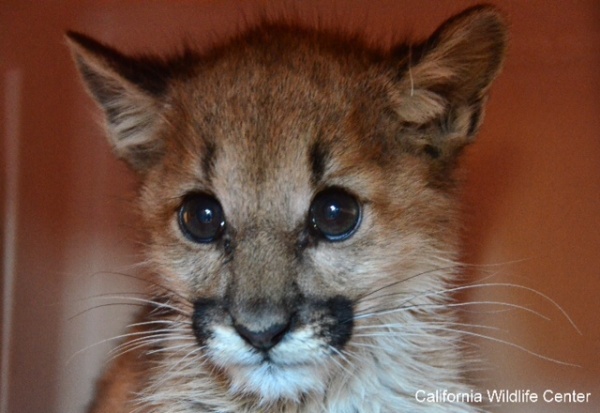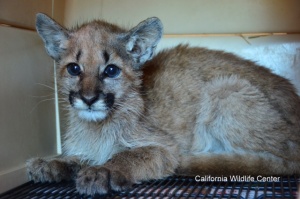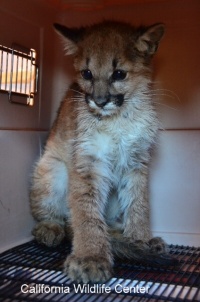On the path to becoming educational ambassadors, the two staving mountain lion cubs found in Burbank earlier this month are “responding well and spending a lot of time with their new trainers,” says David Jackson, director of Zoo to You, a conservation education facility in Paso Robles where the pair were finally delivered earlier this week.
The she-cubs were discovered Dec. 20 under a car near downtown Burbank with residents poking sticks at them (say, we can we all poke sticks at them?); animal authorities transported the pair for a quick stint at the California Wildlife Center in Calabasas for medical care and evaluation.
Today, the young cats are recovering in a comfy indoor room (“much too cold outside for them in their condition,” says Jackson) and have trainers visiting them 8-10 times a day to teach the scared felines that these humans are friends, not foes. Wildlife experts agree that such young cats are not good candidates to be released back into the wild because they haven’t been trained to hunt and they’ve been overexposed to human contact.
“It’s going to take a lot of time and patience for them to realize that they don’t have to be afraid of us,” says Jackson. “But we have great trainers and we never use negative reinforcement with our animals, even if they misbehave. When that happens, we ‘become a tree.’ We stop everything, stay calm and ignore their behavior.”
Overall, Jackson says he’s seen progress in the few days since the cubs have arrived at the compound. Looking somewhat like giant housecats with oversized paws, the cubs bear fluffy tawny fur and dark-blue eyes that will eventually turn gold when they are older. Sure, there’s a lot of spitting and hissing, but that’s all part of the process, says Jackson. His biggest goal, however, is to see them put on weight.
Upon arrival, they were a scrawny 9 and 11 pounds. “They should be 25-35 pounds. But you can’t just stuff ‘em,” says Jackson. “You start them out with bland foods, chicken, mice, rats and then work up to the richer meat they need.”
It’s unknown what happened to their mother, but Jackson recently heard from a Department of Fish and Game (DFG) biologist who has been tracking animals in the nearby Verdugo Mountains – seems as if a wildlife tracking video caught an adult male with two cubs back on October 27. “It’s possible that these are the same cubs,” says Jackson who theorizes that the two youngsters probably ventured into human territory for food while the older – and wiser – male stayed back.
Click here to watch video of cubs in the Verdugo Mountains. Click here to view the nearby adult male.
The DFG estimates that there are between 4,000 – 6,000 mountain lions in California; they are not endangered, but they’re considered a “specially protected species” and cannot be hunted.
Mountain lions are the ultimate boogie-man of urban predators. They are painted as the vicious creatures that stalk the shadows for hikers on the trail, children in playgrounds, old people at the bus stop, or pampered pets in backyards.
So untrue, says Jackson who points to a DFG record of mountain lion attacks in the state of California. Since 1890, only seven people were killed by mountain lions and ten nonfatal incidents were reported. “You’re more likely to get hit by lightning twice then be attacked by a mountain lion,” he says. “They don’t want to be near us at all.”
Mountain lions are not the blood-hungry cat of our collective human nightmare; in truth they are solitary hunters, elusive and shy. They don’t hang out in prides and only meet up with others of their kind for mating. They want to be left alone and far away from humans as possible.
Still urban and rural folk need constant reminders that the big cat in not their enemy. Jackson hopes that these two she-cubs – which have garnered a lot of public sympathy and local fame – offer a unique chance for conservation education.
“The potential that these two have is enormous,” he says. With more than 300 education animals, his facility currently has two zoo-born older male mountain lions. Having a pair of wild cats with a dramatic backstory may soften the hardest of hearts and allow their real identity of the mountain lion to shine through the fear.
“I think these cubs present an awesome chance for many people to realize the beauty and grace of these predators that live so close to us,” says Jackson. “What a wonderful way these two can change many hearts and minds about mountain lions.”
Note: Zoo to You is accepting name suggestions from the public on the organization’s Facebook page. Earn long lasting fame for sending in the perfect moniker for the girls.
By Brenda Rees, photos courtesy of the California Wildlife Center



